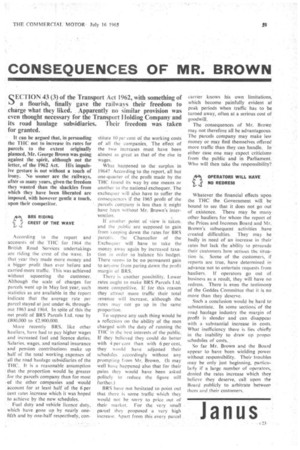CONSEQUENCES OF MR. BROWN
Page 61

If you've noticed an error in this article please click here to report it so we can fix it.
SECTION 43 (3) of the Transport Act 1962, with something of 10 a flourish, finally gave the railways their freedom to charge what they liked. Apparently no similar provision was even thought necessary for the Transport Holding Company and its road haulage subsidiaries. Their freedom was taken for granted.
It can be argued that, in persuading the TUC not to increase its rates for parcels to the extent originally planned, Mr. George Brown was going against the spirit, although not the letter, of the 1962 Act. His impulsive gesture is not without a touch of irony. No sooner are the railways, after so many years, given the freedom they wanted than the shackles from which they have been liberated are imposed, with however gentle a touch, upon their competitor.
nBRS RIDING CREST OF THE WAVE
According to the report and accounts of the THC for 1964 the British Road Services undertakings are riding the crest of the wave. In that year they made more money and a bigger profit than ever before and carried more traffic. This was achieved without squeezing the customer. Although the scale of charges for parcels went up in May last year, such statistics as are available in the report indicate that the average rate per parcel stayed at just under 4s. throughout 1963 and 1964. In spite of this the net profit of BRS Parcels Ltd. rose by £800.000 to £2,900,000.
More recently BRS. like other hauliers, have had to pay higher wages and increased fuel and licence duties. Salaries, wages, and national insurance and pension contributions make up half of the total working expenses of all the road haulage subsidiaries of the THC. It is a reasonable assumption that the proportion would be greater ,for the parcels company than for most of the other companies and would account for at least half of the 6 per cent rates increase which it was hoped to achieve by the new schedules.
Fuel duty and vehicle licence duty, which have gone up by nearly onefifth and by one-half respectively, con
stitute 10 per cent of the working costs of all the companies. The effect of the two increases must have been almost as great as that of the rise in wages.
What happened to the surplus in 1964? According to the report, all but one-quarter of the profit made by the THC found its way by one means or another to the national exchequer. The exchequer will also have to suffer the consequences if the 1965 profit of the parcels company is less than it might have been without Mr. Brown's intervention.
If another point of view is taken, and the public are supposed to gain from keeping down the rates for BRS parcels. the Chancellor of the Exchequer will have to take the money away again by increased taxation in order to balance his budget. There seems to be no permanent gain to anyone from paring down the profit margin of BRS.
There is another possibility. Lower rates ought to make BRS Parcels Ltd. more competitive. If for this reason they attract more traffic their total revenue will increase, although th.e rates may not go up in the same proportion.
To suppose any such thing would be a reflection on the ability of the men charged with the duty of running the THC in he best interests of the public. If they believed they could do better with 4 per cent than with 6 per cent, they would have adjusted their schedules accordingly without any prompting from Mr. Brown. (It may well hae happened also that for their pains they would have been asked politely to reduce the figure still further.) BRS have not hesitated to point out that there is some traffic which they would not be sorry to price out of their market. For the very small parcel they proposed a very high increase. Apart from this every parcel carrier knows his own limitations, which become painfully evident at peak periods when traffic has to be turned away, often at a serious cost of
The consequences of Mr. Brown may not therefore all be advantageous The parcels company may make less. money or may find themselves offered more traffic than they can handle. In either case One may expect criticisms from the public and in Parliament Who will then take the responsibility?
aOPERATORS WILL HAVE NO REDRESS
Whatever the financial effects upon the THC the Government will be bound to see that it does not go out of existence. There may be many other hauliers for whom the report of the Prices and Incomes Board and Mr. Brown's subsequent activities have created difficulties. They may be badly in need of an increase in their" rates but lack the ability to persuade their customers how serious the situation is. Some of the customers, if reports are true, have determined in advance not to entertain requests from hauliers. If operators go out of business as a result, they will have no redress. There is even the testimony of the Geddes Committee that it is no more than they deserve.
Such a conclusion would be hard to substantiate. In some sectionS of the road haulage industry the margin of profit is slender and can disappear with a substantial increase in costs. What inefficiency there is lies chiefly in the inability to draw up proper schedules of costs.
So far Mr. Brown and the Board appear to have been wielding powei without responsibility. Their troubles may be only just beginning, particularly if a large number of operators, denied the rates increase which they believe they deserve, call upon the Board publicly to arbitrate between them and their customers.
Janus




























































































































